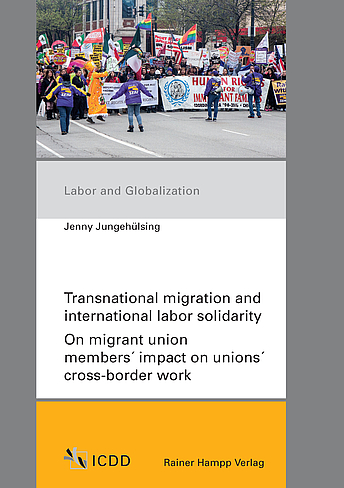Jungehülsing
Transnational migration and international labor solidarity
ISBN 978-3-86618-897-6
englischThis book sheds light on the role that migrant union members and their transnational connections play in unions´ cross-border work.
By bringing together concepts from (international labor) solidarity theory and transnational migration research, it shows that migrants organized in labor unions and their manifold cross-border ties and networks, transnational ways of belonging, and the social remittances and cultural knowledge they bring, can help overcome some major obstacles to international labor solidarity.
Based on exploratory empirical research in two very different US labor unions with large migrant memberships – the United Service Workers West (USWW) local of the Service Employees International Union (SEIU) in California and United Steelworkers (USW) District 7 in Illinois and Indiana –, the book shows that migrants and their transnational connections can: (1) promote international solidarity where it did not exist before; (2) contribute to a more comprehensive understanding of unionism and solidarity that includes political and social justice goals, including abroad; and (3) promote a practical solidarity work including the rank and file, and thereby the development of a sense of togetherness of workers across borders.
This book sheds light on the role that migrant union members and their transnational connections play in unions´ cross-border work.
By bringing together concepts from (international labor) solidarity theory and transnational migration research, it shows that migrants organized in labor unions and their manifold cross-border ties and networks, transnational ways of belonging, and the social remittances and cultural knowledge they bring, can help overcome some major obstacles to international labor solidarity.
Based on exploratory empirical research in two very different US labor unions with large migrant memberships – the United Service Workers West (USWW) local of the Service Employees International Union (SEIU) in California and United Steelworkers (USW) District 7 in Illinois and Indiana –, the book shows that migrants and their transnational connections can: (1) promote international solidarity where it did not exist before; (2) contribute to a more comprehensive understanding of unionism and solidarity that includes political and social justice goals, including abroad; and (3) promote a practical solidarity work including the rank and file, and thereby the development of a sense of togetherness of workers across borders.


